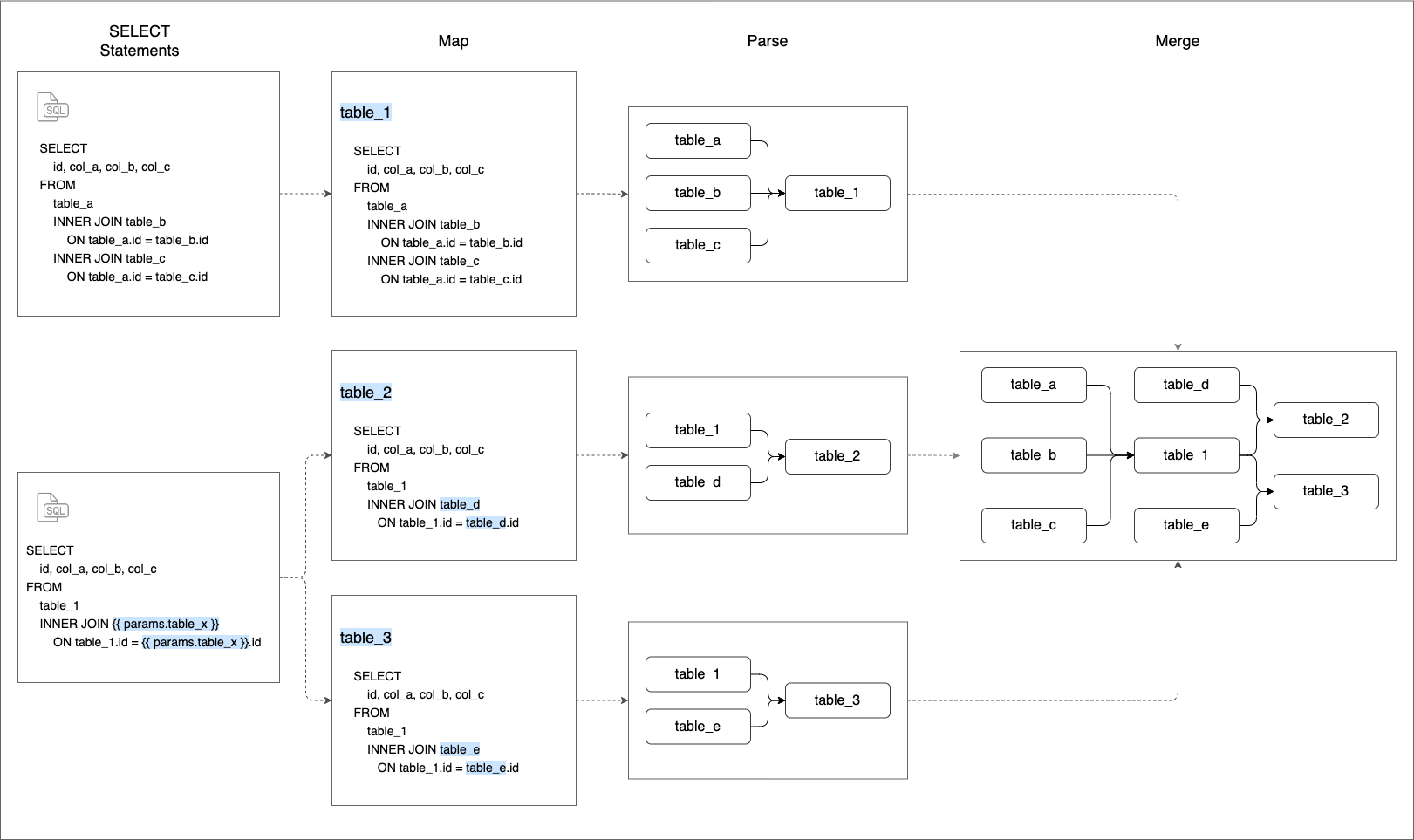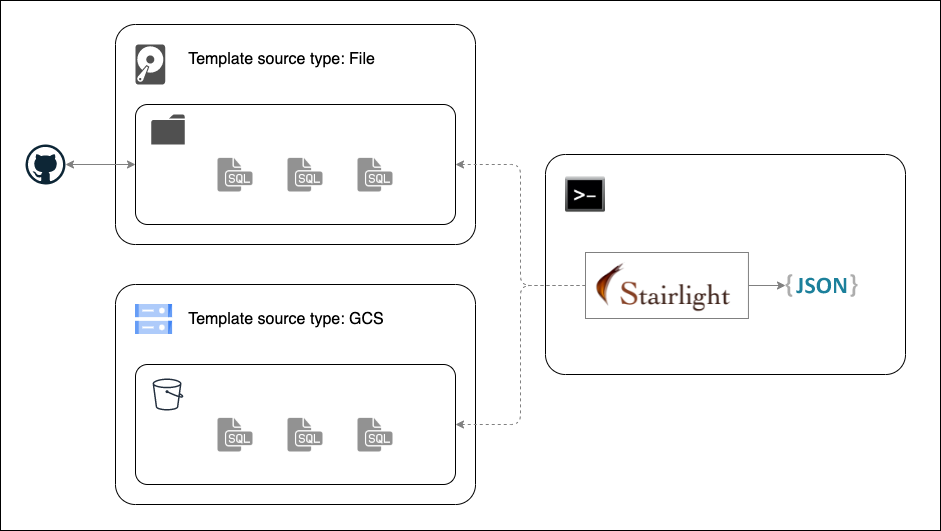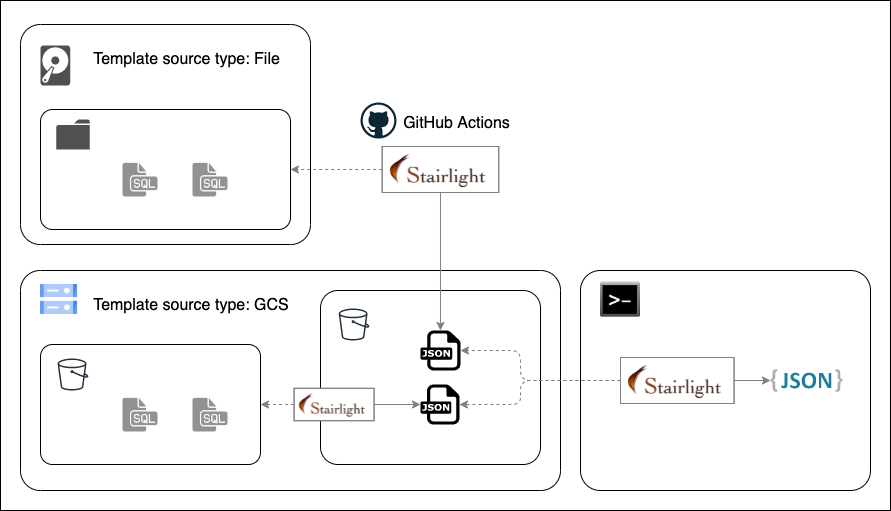Data lineage tool
Project description

Stairlight
Stairlight is a data lineage tool, detects table dependencies from rendered SQL statements.

Supported Data Sources
| Data Source | Remarks |
|---|---|
| Local file system | Python Pathlib module |
| Amazon S3 | Available for Amazon Managed Workflows for Apache Airflow (MWAA) |
| Google Cloud Storage | Available for Google Cloud Composer |
| dbt - Google BigQuery | Using dbt compile command internally |
| Redash |
Installation
This package is distributed on PyPI.
# The base package is for local file system only.
$ pip install stairlight
# Set extras when detecting from other data sources.
# e.g. Amazon S3 and Google Cloud Storage
$ pip install "stairlight[s3, gcs]"
| Data Source | TemplateSourceType | Extra |
|---|---|---|
| Local file system | File | - |
| Amazon S3 | S3 | s3 |
| Google Cloud Storage | GCS | gcs |
| dbt - Google Bigquery | dbt | dbt-bigquery |
| Redash | Redash | redash |
Getting Started
There are 3 steps to use.
# 1: Initialize and set your data source settings
$ stairlight init
# 2: Map your SQL statements and tables
$ stairlight map
# 3: Get table dependencies
$ stairlight
Description
Input
- SQL statements
- Configuration YAML files
- stairlight.yaml: SQL statements locations and include/exclude conditions.
- mapping.yaml: For mapping SQL statements and tables.
Output
Stairlight outputs table dependencies as JSON format.
Top-level keys are table names, and values represents tables that are the data source for each key's table.
Example
{
"test_project.beam_streaming.taxirides_aggregation": {
"test_project.beam_streaming.taxirides_realtime": {
"TemplateSourceType": "File",
"Key": "tests/sql/union_same_table.sql",
"Uri": "/foo/bar/stairlight/tests/sql/union_same_table.sql",
"Lines": [
{
"LineNumber": 6,
"LineString": " test_project.beam_streaming.taxirides_realtime"
},
{
"LineNumber": 15,
"LineString": " test_project.beam_streaming.taxirides_realtime"
}
]
}
},
"PROJECT_a.DATASET_b.TABLE_c": {
"PROJECT_A.DATASET_A.TABLE_A": {
"TemplateSourceType": "GCS",
"Key": "sql/one_line/one_line.sql",
"Uri": "gs://stairlight/sql/one_line/one_line.sql",
"Lines": [
{
"LineNumber": 1,
"LineString": "SELECT * FROM PROJECT_A.DATASET_A.TABLE_A WHERE 1 = 1"
}
],
"BucketName": "stairlight",
"Labels": {
"Source": null,
"Test": "a"
}
}
},
"AggregateSales": {
"PROJECT_e.DATASET_e.TABLE_e": {
"TemplateSourceType": "Redash",
"Key": 5,
"Uri": "AggregateSales",
"Lines": [
{
"LineNumber": 1,
"LineString": "SELECT service, SUM(total_amount) FROM PROJECT_e.DATASET_e.TABLE_e GROUP BY service"
}
],
"DataSourceName": "BigQuery",
"Labels": {
"Category": "Sales"
}
}
},
"dummy.dummy.example_b": {
"PROJECT_t.DATASET_t.TABLE_t": {
"TemplateSourceType": "dbt",
"Key": "tests/dbt/project_01/target/compiled/project_01/models/b/example_b.sql",
"Uri": "/foo/bar/stairlight/tests/dbt/project_01/target/compiled/project_01/models/b/example_b.sql",
"Lines": [
{
"LineNumber": 1,
"LineString": "select * from PROJECT_t.DATASET_t.TABLE_t where value_a = 0 and value_b = 0"
}
]
}
},
"PROJECT_as.DATASET_bs.TABLE_cs": {
"PROJECT_A.DATASET_A.TABLE_A": {
"TemplateSourceType": "S3",
"Key": "sql/one_line/one_line.sql",
"Uri": "s3://stairlight/sql/one_line/one_line.sql",
"Lines": [
{
"LineNumber": 1,
"LineString": "SELECT * FROM PROJECT_A.DATASET_A.TABLE_A WHERE 1 = 1"
}
],
"BucketName": "stairlight",
"Labels": {
"Source": null,
"Test": "a"
}
}
}
}
Collecting patterns
Centralization

Agents

Configuration
Examples can be found here, used for unit testing in CI.
stairlight.yaml
'stairlight.yaml' is for setting up Stairlight itself. It is responsible for specifying SQL statements to be read.
stairlight init creates a template of stairlight.yaml.
Example
Include:
- TemplateSourceType: File
FileSystemPath: ./tests/sql
Regex: .*/*\.sql$
DefaultTablePrefix: "PROJECT_A"
- TemplateSourceType: GCS
ProjectId: null
BucketName: stairlight
Regex: ^sql/.*/*\.sql$
DefaultTablePrefix: "PROJECT_A"
- TemplateSourceType: Redash
DatabaseUrlEnvironmentVariable: REDASH_DATABASE_URL
DataSourceName: BigQuery
QueryIds:
- 1
- 3
- 5
- TemplateSourceType: dbt
ProjectDir: tests/dbt/project_01
ProfilesDir: tests/dbt
Vars:
key_a: value_a
key_b: value_b
- TemplateSourceType: S3
BucketName: stairlight
Regex: ^sql/.*/*\.sql$
DefaultTablePrefix: "PROJECT_A"
Exclude:
- TemplateSourceType: File
Regex: main/exclude\.sql$
Settings:
MappingFilesRegex:
- .*/mapping\_file\.yaml$
- .*/mapping\_gcs\.yaml$
- .*/mapping\_dbt\.yaml$
- .*/mapping\_s3\.yaml$
# Deprecated from v0.7.2
MappingPrefix: "mapping"
mapping.yaml
'mapping.yaml' is used to define relationships between input SELECT statements and tables.
stairlight map creates a template of mapping.yaml and attempts to read from data sources specified in stairlight.yaml.
If successfully read, it outputs settings that have not yet configured in an existing 'mapping.yaml' file.
Example
Global:
Parameters:
DESTINATION_PROJECT: stairlight
params:
PROJECT: 1234567890
DATASET: public
TABLE: taxirides
Mapping:
- TemplateSourceType: File
FileSuffix: "tests/sql/union_same_table.sql"
Tables:
- TableName: "test_project.beam_streaming.taxirides_aggregation"
Parameters:
params:
source_table: source
destination_table: destination
IgnoreParameters:
- execution_date.add(days=1).isoformat()
- TemplateSourceType: GCS
Uri: "gs://stairlight/sql/one_line/one_line.sql"
Tables:
- TableName: "PROJECT_a.DATASET_b.TABLE_c"
- TemplateSourceType: Redash
QueryId: 5
DataSourceName: metadata
Tables:
- TableName: New Query
Parameters:
table: dashboards
Labels:
Category: Redash test
- TemplateSourceType: dbt
ProjectName: project_01
FileSuffix: tests/dbt/project_01/target/compiled/project_01/models/example/my_first_dbt_model.sql
Tables:
- TableName: dummy.dummy.my_first_dbt_model
- TemplateSourceType: S3
Uri: "s3://stairlight/sql/one_line/one_line.sql"
Tables:
- TableName: "PROJECT_as.DATASET_bs.TABLE_cs"
ExtraLabels:
- TableName: "PROJECT_A.DATASET_A.TABLE_A"
Labels:
Source: Null
Test: a
Global Section
This section is for global configurations.
Parameters is used to set common parameters. If conflicts has occurred with Parameters in mapping section, mapping section's parameters will be used in preference to global.
Mapping Section
Mapping section is used to define relationships between input SELECT statements and tables that created as a result of query execution.
Parameters allows you to reflect settings in jinja template variables embedded in statements. If multiple settings are applied to a statement using jinja template, the statement will be read as if there were the same number of queries as the number of settings.
In contrast, IgnoreParameters handles a list to ignore when rendering queries.
Extra labels Section
This section sets labels to tables that appears only in queries.
Arguments and Options
$ stairlight --help
usage: stairlight [-h] [-c CONFIG] [--save SAVE] [--load LOAD] {init,check,up,down} ...
An end-to-end data lineage tool, detects table dependencies by SQL SELECT statements.
Without positional arguments, return a table dependency map as JSON format.
positional arguments:
{init,map,check,list,up,down}
init create a new Stairlight configuration file
map (check) create a new configuration file about undefined mappings
list return all ( tables | URIs )
up return upstairs ( tables | URIs )
down return downstairs ( tables | URIs )
optional arguments:
-h, --help show this help message and exit
-c CONFIG, --config CONFIG
set a Stairlight configuration directory
-q, --quiet keep silence
--save SAVE A file path where map results will be saved.
You can choose from local file system, GCS, S3.
--load LOAD A file path where map results are saved.
You can choose from local file system, GCS, S3.
It can be specified multiple times.
init
stairlight init creates a new Stairlight configuration file.
$ stairlight init --help
usage: stairlight init [-h] [-c CONFIG]
optional arguments:
-h, --help show this help message and exit
-c CONFIG, --config CONFIG
set a Stairlight configuration directory
-q, --quiet keep silence
map(check)
stairlight map creates a new configuration file about undefined settings. stairlight check is an alias.
Options are the same as stairlight init.
list
stairlight list outputs all of tables or SQL URIs.
- Output option(
-o,--output) determines the output type, tables or URIs.
up
stairlight up outputs tables or SQL URIs located upstream(upstairs) from the specified table.
- Use table(
-t,--table) or label(-l,--label) option to specify tables to search. - Output option(
-o,--output) is same asstairlight list. - Recursive option(
-r,--recursive) is set, Stairlight will find dependencies recursively and output as a list. - Verbose option(
-v,--verbose) is set, Stairlight will add detailed information and output it as a dict.
$ stairlight up --help
usage: stairlight up [-h] [-c CONFIG] [--save SAVE] [--load LOAD] (-t TABLE | -l LABEL) [-o {table,uri}]
[-v] [-r]
optional arguments:
-h, --help show this help message and exit
-c CONFIG, --config CONFIG
set a Stairlight configuration directory
-q, --quiet keep silence
--save SAVE A file path where mapped results will be saved.
You can choose from local file system, GCS, S3.
--load LOAD A file path where mapped results are saved.
You can choose from local file system, GCS, S3.
It can be specified multiple times.
-t TABLE, --table TABLE
table names that Stairlight searches for, can be specified
multiple times. e.g. -t PROJECT_a.DATASET_b.TABLE_c -t
PROJECT_d.DATASET_e.TABLE_f
-l LABEL, --label LABEL
labels set for the table in mapping configuration, can be specified multiple times.
The separator between key and value should be a colon(:).
e.g. -l key_1:value_1 -l key_2:value_2
-o {table,uri}, --output {table,uri}
output type
-v, --verbose return verbose results
-r, --recursive search recursively
down
stairlight down outputs tables or SQL URIs located downstream(downstairs) from the specified table.
Options are the same as stairlight up.
Use as a library
Stairlight can also be used as a library.
tosh2230/stairlight-app is a sample web application rendering table dependency graph with Stairlight, using Graphviz, Streamlit and Google Cloud Run.
Project details
Release history Release notifications | RSS feed
Download files
Download the file for your platform. If you're not sure which to choose, learn more about installing packages.
Source Distribution
Built Distribution
Hashes for stairlight-0.9.1-py3-none-any.whl
| Algorithm | Hash digest | |
|---|---|---|
| SHA256 | 871685d4af8e4c9e4a44f8d026773f1b7073723009a1ab9f6881c40396c6b974 |
|
| MD5 | 8ccadedb8a65f5dd1b6f13e69d2bbfcb |
|
| BLAKE2b-256 | 0d01fda36e98700aa25cecb73cc44c419491ac28ba746f297b023245ceb35fb3 |
















